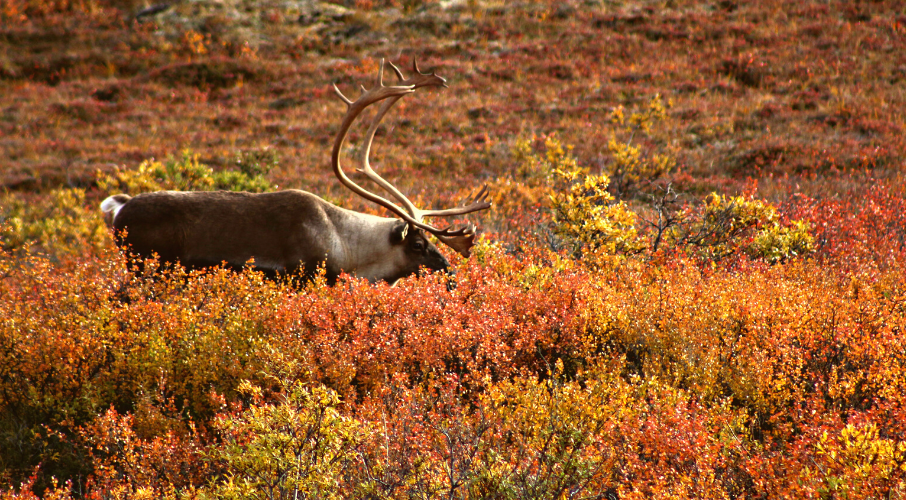
This article originally appeared in the Globe and Mail.
By JP Gladu and Ken Coates, June 13, 2022
Sometimes the smallest stories foreshadow the greatest transformations. Around a decade ago, the Saulteau First Nation, West Moberly First Nation, the University of British Columbia and the Yellowstone to Yukon Conservation Initiative created a partnership that sought to protect the Klinse-Za mountain caribou herd in central B.C. The herd population was near total collapse, down to fewer than 40 animals, but has since rebounded to more than 110.
Caribou hold pride of place in many Indigenous cultures, providing a primary source of food and playing vital roles in community life. They are also a touchstone species – when threatened, a decline in their well-being is an early indicator of impending ecological collapse. Across North America, once-large caribou herds are currently at great risk. In some areas, the harvesting of caribou has been curtailed dramatically to protect the herds, and Indigenous peoples have been the first to be affected by these ecological changes.
In many regions, Indigenous food production from caribou has fallen precipitously. But that is only the start. Barred from hunting, fishing or trapping by other urgent conservation requirements, Indigenous people are increasingly losing out on crucial traditional learning opportunities and life-giving access to the land. When hunting is limited, young Indigenous people are not introduced to the harvesting practices that sustained their communities for thousands of years.
Indigenous peoples bear most of the burden of ecological deterioration; environmental restrictions can lead to cultural decline in a way that few, if any, non-Indigenous peoples appreciate. While forcing a commercial fisherman to cut back on operations can be devastating and non-Indigenous hunters can be profoundly upset by hunting restrictions, the consequences fall far short of the impact on First Nations, Inuit and Métis communities.
Losing access to land is similarly destructive. When separated from their lands, Indigenous peoples lose access to key parts of their culture, including their languages, traditional place names and family activities. Indigenous knowledge is also crucial in helping to address climate change; by separating communities from their lands, we are senselessly endangering a critical knowledge system.
In response, Indigenous peoples have stepped forward to take on a greater role in environmental management in Canada – the Klinse-Za caribou herd collaboration is one such example. Governments in Nunavut and northern Quebec have found ways to share information and authority over natural resource management. Modern treaties negotiated between governments and Indigenous communities in Yukon, the Northwest Territories and B.C. have transformed top-down environmental management regimes into co-management regimes with high-level Indigenous involvement (the treaties remain works in progress; merging Indigenous and Western scientific knowledge is an invaluable but difficult process).
Equally important is the growing number of Indigenous communities asserting their rights to manage their traditional territories. In the Yukon, for example, the Carcross-Tagish First Nation declared in March that any new developments on their territories must pass through their approval process. The Tk’emlúps te Secwépemc of British Columbia are implementing a resource law to guarantee their involvement in any development activities on their territory. And Mi’kmaq First Nations in Atlantic Canada are using their court-defined rights to assert their independence in managing their fisheries.
In Northern Ontario, a more complex scenario is unfolding. The Ministry of Northern Development, Mines, Natural Resources and Forestry is engaging in a significant transformation of fauna in the region, reducing the moose population by issuing more hunting tags for female moose and by moving caribou back into the area. These developments may, in the long run, be good for the environment and even for regional residents. But they are happening without extensive collaboration or endorsement by the region’s First Nations. If government agencies wish to move forward in co-operation with Indigenous peoples and communities, they must do so throughout the process and transparently share their jurisdiction with First Nations.
The continuing struggle with salmon stocks, herring and other marine species on the West Coast highlights the intensity of these issues. Each year seems to bring more closings of fisheries and additional evidence of the inability of the Western scientific tradition to sustain well-managed fishery populations. And so, First Nations have stepped forward.
The Gwa’sala-’Nakwaxda’xw First Nation on Vancouver Island recently declared control over fishing in their traditional waters. Their rejection of the Department of Fisheries and Oceans (DFO) was starkly expressed by former chief Paddy Walkus at a ceremony in March: “We need to take back the control, take back what was rightfully ours, because at no time did we give any kind of okay to anyone to do the management or caretaking of our resources, in particular the fisheries resource. We all know what has happened recently, the decimation of all species of fish in all of our waters … the harm that has happened through the mismanagement of DFO.”
Comparable steps have been taken by First Nations eager to assert a greater role in the management of the forest industries. Indigenous assertiveness has grown apace. For the most part, resource developers understand the new realities. Mining and oil and gas companies active in Canada have embraced their obligations to involve Indigenous peoples in environmental management.
Indigenous involvement in ecological affairs must be embraced, not rejected. Indigenous engagement provides a valuable counterbalance to traditional ecological management by governments. First Nations, Métis and Inuit people have a massive stake in the protection and enhancement of their natural surroundings. Cultural survival requires it, but the assertion of Indigenous rights is also in the collective interests of the environment and all Canadians.
JP Gladu is a senior fellow at the Macdonald-Laurier Institute, and an Indigenous business leader. Ken Coates is a distinguished fellow at the Macdonald-Laurier Institute, and a Canada Research Chair at the University of Saskatchewan.





